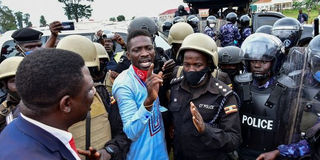Dark end of week, but weekend of reflection

What you need to know:
Police and other security agencies indiscriminately started beating and shooting live bullets at demonstrators and spectators standing on balconies of shopping arcades and “innocent” civilians going about their businesses amid the protests
I readied myself for work by 5am last Wednesday. I read a few pages of my monthly picked book, I took a glass of hot water and moved out for the new day’s challenges. A scroll through the webs and microblogs, the news about Mr Robert Kyagulanyi, aka Bobi Wine’s arrest, was all over. Moments later, boda boda cyclists started chanting “Free BobiWine” and hooting their motorcycles in and around the city in protest against his arrest.
Police and the military swung into action and before I knew it, the artificial clouds had descended closer to the earth through the window and doors of buildings, with an announcement that the gardeners had squeezed paper in them, we sneezed and coughed- it was never a nice pall of smoke! Businesses, public transport and other aspects of our daily life were paralysed.
Police and other security agencies indiscriminately started beating and shooting live bullets at demonstrators and spectators standing on balconies of shopping arcades and “innocent” civilians going about their businesses amid the protests.
Photos of heinous acts from the civilians and police kept flowing on social media for the two days until the presidential hopeful, Bobi Wine was released.
Accusatory fingers kept being pointed in every direction of the political divide without discussing the fundamentals like breaches of the laws regulating assemblies, demonstrations protests and riots.
For starters, the supreme law of the land gives police powers under Article 212 to, among others, protect lives and property, and keep law and order. These powers are never in dispute. The only question is always on how they are exercised after balancing their exercising with the obligatory duty to respect, uphold and promote human rights guaranteed in the Bill of Rights.
In handling the demonstrations or assemblies, the police are supposed to presume them peaceful and facilitate them. However much violent demonstrations have no fortification of the 1995 Constitution, a mere apprehension of violence is not enough reason to halt the assembly.
The Constitutional Court in Human Rights Network Uganda & 4 Others V AG Constitutional Petition 56 of 2013, Justice Elizabeth Musoke, held, among others that violence by some protesters should not lead to the dispersal of the demonstration, the police is supposed to apprehend violent elements and charge them according to the laws. But peaceful demonstrations should not be stopped because of a few actions of criminality by protestors.
Justice Kenneth Kakuru emphasised in the above petition that it is the nature and price of democracy that in the enjoyment of rights and freedoms, there will be a likelihood of negative impact on other people’s rights. He concluded that the contention that public assemblies, which include spur-of-the-moment as the ones we had in Kampala and other areas, should be stopped because they would disrupt business, traders or commerce, has no basis at all. This conclusion reverberates Justice Musoke’s conclusion that it is not for police to decide where the protests or demonstrations should be held.
With all fairness, the disproportionate actions by police and sister forces of indiscriminately shooting at protesters and other people going about their business, yet they have many options at their disposal, was prohibitive and not regulatory of demonstrations. The right to assembly should not be unjustifiably throttled through methods that are contrary to constitutionally guaranteed tests and imperatives.
Morgan Apollo Muhindo,



